Debt has a way of making you feel like there’s no solution. You feel you’ll always be like this, living off money that isn’t yours and sinking your paycheque into a balance that never seems to get smaller. However, there are lots of solutions to deal with debt worldwide, and you can get back on track faster than you think.
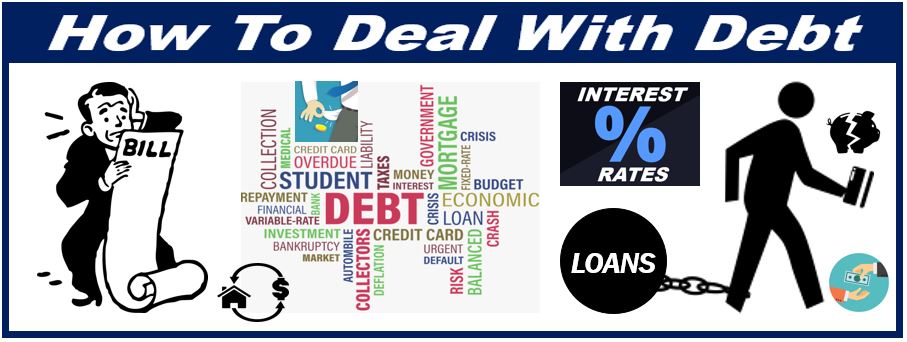
When you’re struggling to pay your debts, one of the best things you can do is find out your options for dealing with debt, and arm yourself with knowledge about debt collectors, and your rights against them. Unfortunately, the debt collection industry is booming worldwide at the moment.
Often, debt collection companies will even buy your debts from your original creditor. You may owe money to your bank, and suddenly find yourself being chased by companies you’ve never heard of before, like Capquest Debt Recovery in the UK and Debt Nirvana in India, who are hoping that you’ll pay them the full amount.
Don’t worry, though. You can’t go to prison for being unable to pay off most loans. However, living with debt has a chronic negative effect on your health and wellbeing. If you have debt, the good news is that there are lots of lifestyle changes you can make to pay it off faster and enjoy the debt-free life you deserve.
If you have debt that you simply can’t pay off, even with significant changes to your budget and lifestyle, there are also solutions such as payment breaks, and formal solutions such as bankruptcy that will write off your debt (although this is a serious decision, which affects your life significantly).
In this article, we’ll cover solutions to deal with debt in three major world countries: India, the United Kingdom and the United States of America.
What are solutions to deal with debt worldwide?
Solutions to deal with debt worldwide include things you can do yourself, such as creating a budget and putting the money you save towards your debt, and using psychological techniques such as the ‘debt snowball’ method, where you pay off your debt in order of smallest to largest.
Solutions to deal with debt worldwide also include debt management plans, which you should organise with the support of a debt charity, debt consolidation loans, loan payment holidays, and, as a last resort, bankruptcy.
India
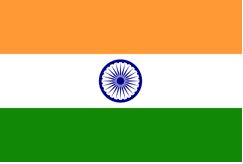
If you have some form of personal debt, whether it’s through credit cards, personal loans and insurance plans, you’re definitely not the only one. Indian households had debts worth Rs 43.5 trillion by the end of March 2020 last year. While there are many reasons people take out loans, the negative health effects of watching your money drain from your account and straight into balances that never seem to shift are undeniable. The sooner you take strict action on your debt, the better you will feel. Let’s look at solutions to deal with debt in India.
How do I get out of debt with no money?
While you may not have the thousands of rupees to wipe out your debt all at once (if you had those, you wouldn’t be in debt, right?), there are many things you can do to slash your debt faster than you could have imagined. We also have advice on what to do if you’re in very serious debt that you can never pay, or you’ve lost all your income through unemployment.
Create a budget
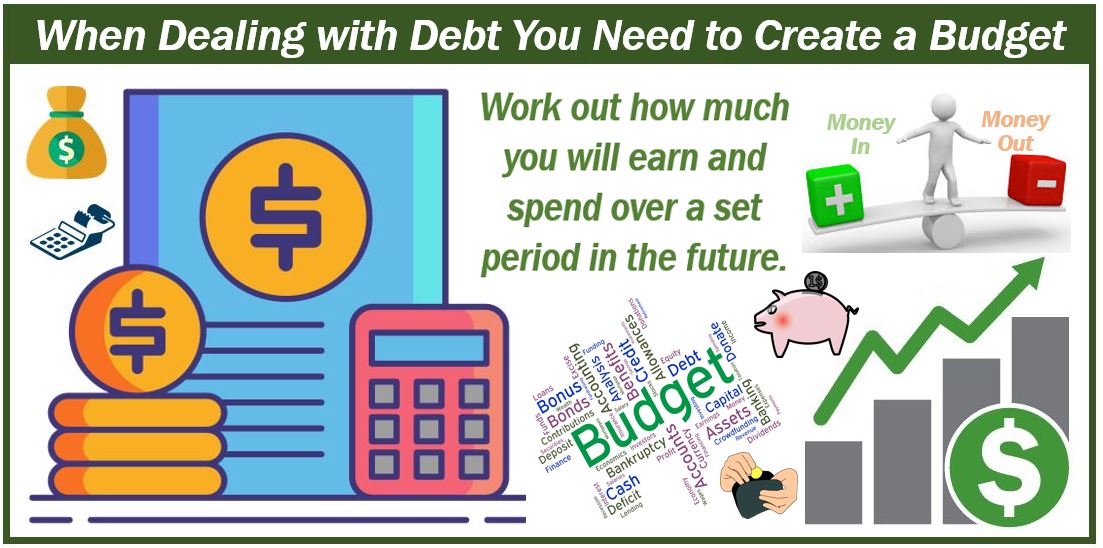
Budgeting as a solution to debt may sound so obvious it’s not worth mentioning, but you’d be surprised how few people know how to budget properly, especially if they’re managing their finances on their own for the first time. There are lots of tips and tricks you can apply to stop excess money leaking out of your account, and each paisa you keep adds up.
To create a budget, write down your monthly income, whether that’s from a salary, pension or any other income. Then, make a list of your essential expenses. These are: rent or home loan, household bills, food, insurance bills, other loans and travel – basically, anything that you need to sustain your existence and keep out of financial trouble. Take away this total amount from your income, and what you have left is your disposable income.
Then, make a list of your ‘wants’, what you’d usually spend on eating out and entertainment (non-essential expenses). You’ll be able to see how much money is going towards non-essential expenses, and then you can cut down on these non-essential expenses to direct the money towards paying off your debt faster.
A little entertainment is good, but it’s better if you can allocate a fixed, small amount to spend on this per month, rather than spending money on it whenever you feel like it and not tracking your expenses. Spend a little time each month planning your monthly budget, so you know exactly what you’re spending, both on essential and non-essential expenses.
The rest of the money, you put towards your debt, keeping back a little for emergencies. Be careful, though, because some loans and credit cards penalise you for paying them off early.
You can also look at your essential expenses, and see where you can make savings. Can you buy a cheaper brand of food, for example? Can you purchase a smart-card rather than paying daily for a bus fare? Times of India has some good solutions for cutting down your electricity bills by over 50%.
Debt snowball method
Struggling with debt can be as much a psychological issue as a practical one. When you’re bogged down in what feels like huge figures you have to pay off, the motivation to get debt free can really go, and you assume life will be like this forever. Worse, you may get in the habit of taking out more credit, and just make it a way of life.
What you need to do is purposefully commit to getting debt free, and the debt snowball method is a great way to keep up your motivation for paying off debt. You focus on paying off your smallest debt first, while making the minimum payments on all your other loans. This way you get the rush of paying off your debt faster, and once you’ve slashed the balances on your smallest debt, you move onto your next smallest, until finally, you’ve paid off all your loans. You can also consider the debt avalanche method, which is when you clear your debt with the highest interest the first, saving yourself money.
Increase your income
As well as slashing your expenses, increasing your income is another way to kill of debt faster. It can be really motivating to see your hard work eliminating the debt that is making your life miserable, particularly if you start to stash away some savings along the way! (of course, this last part might not be possible until you’ve fully cleared some of your debts, but that is totally understandable). If you can, try to take on some side jobs or freelance work. Tutor, do content writing, pick up shifts as a taxi driver or in a restaurant – put your time, skills and experience to work and commit to a debt-free future.
What if I still can’t pay off my debt?
Obviously, there are many situations in which debt is just too much for us. Maybe we’ve lost our jobs due to Covid-19 or a personal difficulty, or we got a loan with rubbish interest terms. If you’re in this situation, we understand how difficult it is, and you shouldn’t feel ashamed. Let’s look at the steps you can take if you’re not able to pay off your debt with lifestyle changes such as budgeting.
Avoid taking out more debt
Unfortunately, there are many unscrupulous and illegal money lenders waiting to ‘help’ people who have fallen on rough financial times. Sometimes if you know you can’t pay rent or debts where payments are due immediately, you panic and think your only way out is to apply for a quick loan, but this often leads to financial disaster.
Lenders may trick you into taking out loans with apparently no or low interest rates, only for interest rates to spike massively beyond what you can afford. Be especially aware of unregulated and illegal cash lending apps, where people offer you money without doing any proper checks on whether you can afford the loan, and then abuse and harass you to pay them huge fees and interest.
Inform your creditors
You should always let your creditors know in advance if you think you will struggle to make your debt repayments. The more you keep them informed and in the loop, the more willing they may be to negotiate with you, rather than taking action against you. You may be able to get a loan waiver for a couple of months or defer some of your payments, although this will be at the discretion of the creditor, and they don’t have to say yes.
If you’re struggling to pay your rent, make sure you tell your landlord and see if they are willing to agree to a rent waiver or deferred payments, rather than risk ending up in arrears and potentially being evicted. You do have rights as a tenant. Your landlord can only issue you a eviction notice if you haven’t paid your rent for three months.
They must also give you 6 months time to pay your rent after issuing the eviction notice, and if you pay them during this time, you can’t be evicted. If your finances recover during this time, for example, you get a job where you previously lost one, you may be able to sort out your rent arrears, especially if you talk to your landlord about a payment plan.
Bank loan defaults
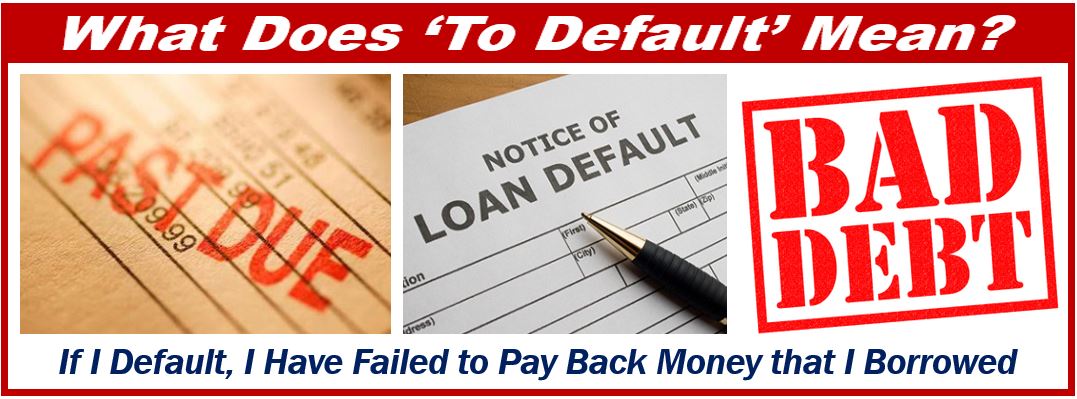
If you’re in a tough financial spot and you’ve defaulted on a bank loan, a bank should do everything they can to assist you. Banks aren’t the same as unscrupulous money lenders, and luckily they have regulations in place to help borrowers (you) pay back things in a sustainable way. If you’ve defaulted on loans and need help paying them, banks may:
- Lower the EMI. Banks may increase the length of your loan, so your amounts each month are smaller. This may make them more affordable, although you may ultimately end up paying more interest as the loan is longer. They may also convert a non-secured loan to a secured loan (which means that your loan is tied to something valuable you own, like a property: if you default on the loan entirely, the bank has the right to take possession of your home). This means that your monthly payments or interest fees should decrease significantly.
- Give you an EMI holiday.
- Accept a lower repayment (called ‘a hair cut’). If you really don’t have the resources to repay your loan and the bank knows it, they may accept a part payment, in order to get something rather than nothing at all from you.
Credit counselling
You may be able to get free support with your debt issues, through debt counselling agencies like Abhay by the Bank of India, and Disha counselling centre by ICICI Bank.
Debt counsellors will often negotiate with creditors on your behalf, helping you work out reasonable repayments with them, according to your situation. They will offer a lot of support on debt and budgeting, helping you save as much money as possible and cope with your debts.
Bankruptcy
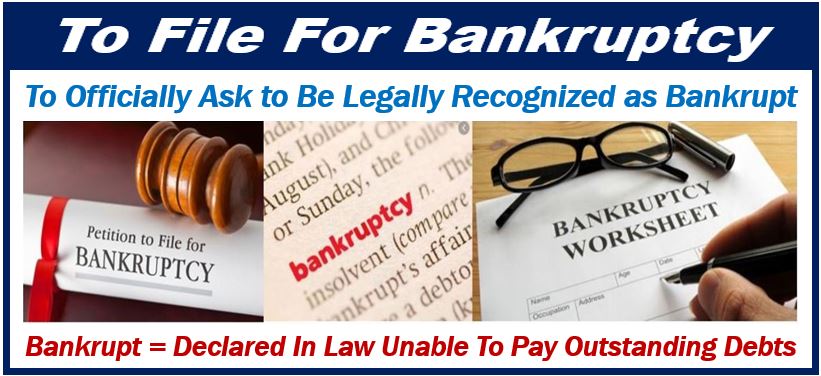
You can file for bankruptcy if you owe more than 500 rupees, although it is a serious decision, and you should always take advice before deciding to do it. If your bankruptcy is accepted by the court, you can then get a stay order against your creditors, to prevent them from trying to recover your debts any more. Once the bankruptcy process is completed and any assets divided among your creditors, you’ll be discharged from your bankruptcy by the court. This gives you a new start, without being hounded by your creditors.
USA

How do I get out of debt if I’m broke?
Seeing as the average American carries $90,460 of debt, if you’re dealing with debt at the moment, you’re not the only one. Most of us have to take on some debt at some point, whether that’s through student loans, medical costs or mortgages, but the negative health effects of owing large sums of money that your monthly repayments barely seem to touch are significant. Swelling interest rates and fees can make debt seem insurmountable, but there are actually many solutions to dealing with debt. Let’s look at them now.
Create a budget
While you might have a vague idea of your incomings and outgoings – you know not to make any diamond studded yachts on a $30,000 salary, for example – there may be savings you can make on your budget that you haven’t realised before. In 2020, a survey showed that 65% of Americans had no idea how much they spent the previous month, and the nail down an exact budget, which tracks every discretionary expense, the quicker you can slash some of that debt.
A great way to budget is the three accounts system. Developed by the UK charity Christians Against Poverty, it helps you separate your money into three accounts, and keep you from accidentally overspending. One account is for all your standing orders and direct debits, for example, your mortgage or rent, household bills and loan repayments, one is for your weekly spending and one is for saving.
Work out your exact income (that is, your monthly salary or government assistance payments), and how much your essential direct debits and standing orders amount to, and place those in the first account. Then, work out how much you need for essential spends such as your groceries, as well as a couple of treats, and place them in your second account. Whatever is left over you can save or put towards clearing your debt faster. This way, you won’t overspend unwittingly, because you have allocated the right amount of cash for each expense, and when it’s gone it’s gone (make sure your weekly spending account doesn’t have an overdraft, to avoid you getting into more debt).
If you feel safe doing so during the pandemic, you can take out your weekly spending money in cash and put it in different envelopes for different expenses (groceries, school shoes, weekly treat if you an afford it), so that you can physically see your cash going down.
You can also look at your essential and non-essential expenses and see where you can make savings. For example, you could compare electricity providers in your state, and choose a cheaper provider. Homeselfe has a list of 50 great tips for cutting down on your energy costs.
Look at what you’re spending on non-essential things too, for example, eating out and entertainment, and see where you could save. It’s good to enjoy a treat now and then if you can afford it, because this is likely to help you stick to your budget if you don’t feel completely restricted, but try making swaps such as recreating your favourite takeaway at home and cut almost three quarters of the price. You can put all the money towards paying off your debt faster.
Use the debt avalanche method
The debt avalanche method is a great way to get rid of those pesky, high-interest debt repayments that are draining your bank account. It’s no fun watching your income disappear into negatives all the time.
The debt avalanche method involves you putting the most money towards your highest-interest debt and clearing that first, while making the minimum monthly payments on your other debts. This should help you save money in the long run, as you’re getting rid of the obligation to pay higher interest quicker. Be careful, though, as some loans will penalise your paying off your debt early.
The debt snowball method is also a good way to tackle your debt – you start with paying off your smallest debt first, so that you’re getting the high of paying off a debt quicker, motivating you to pay off your other debts faster.
Increase your income
Do you have the capacity to take on more work? If you can, do it! Even just a couple of extra hours can really help increase your income, so that you have more to put towards the debt. Can you tutor, mow lawns, or pick up some hours in a supermarket or restaurant? Go for it! Seeing more money flooding into your bank account, and watching the debt shrink, can be really motivating.
Sell your old tech
You should sell anything that you don’t use any more if you’re struggling with debt (try eBay, Amazon, Facebook marketplace, and Craiglist) but selling old tech is a quick win for cash, and more people should do it. So many of us have phones, laptops, tablets lying around that we don’t use any more because we got an upgrade (phone contracts, I’m looking at you).
Some of the newer iPhone models can fetch over $500, so it’s definitely worth doing. First, gather up all the old and abandoned tech in your house that you can possibly fine (even the oldest flip phones lying in your drawer). Then, do some research on how much similar, second-hand models are going for online.
Places that you can sell old phones or other devices, include Gazelle, the biggest U.S cell phone trade-in service and Whistle, which offers premiums at over 50% higher than other online sellers.
What if I still can’t pay off my debt?
If you’re struggling with unaffordable debt, you’re definitely not alone and there are still several options to consider. Sometimes things happen that are simply out of our control. Maybe you lost your job because of the pandemic, or you ended up taking out a Payday loan and the interest spiked beyond what you could pay. Let’s look at solutions to deal with debt when you’re finding it really hard to pay it off.
Consider debt consolidation
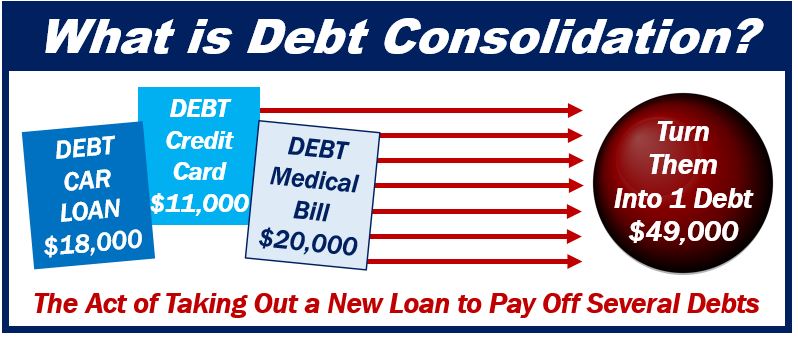
Debt consolidation is when you take multiple loans and debts with high interest and take out another loan, with low interest and better terms, to pay them off. Then, you’re left with a much lower interest loan to pay off, which can help you get your finances in order. Rather than having multiple debts to keep track of, you’ll just have one.
There are a few of options you have for debt consolidation – 0% money balance and balance transfer credit cards, and low-interest personal loans. If you have a lot of credit card debt, 0% balance transfer cards can help you by putting the balance of your credit cards on a lower or no interest card, so that it’s easier to pay off.
Money transfer cards are helpful if you owe your bank money, because you can take the money off the credit card and put it into the bank, clearing the balance. You then owe the credit card provider instead, hopefully at a better interest rate. Be careful, though, because you may have to pay fees for money and balance transfers, so work out if it’s financially worth it to do so. Personal loans allow you to pay off your high-interest debt right away with the money from the loan, and then pay back the loan at a lower interest rate than your previous debt.
It goes without saying that you shouldn’t consider debt consolidation unless the interest rates you’ll pay will be lower than the combined rate of your original debts. Also, you may end up paying more with a debt consolidation loan because even if your interest rates are lower each month, you’ll likely be paying them off over a longer period of time.
Debt Management Plans
If you’re struggling to pay back your debts each month, a debt management plan through a non-profit credit counselling agency could help you get your debt sorted. Make sure you avoid so-called debt relief companies, who often want to make a profit out of your difficulties, and will charge fees. Unlike debt relief companies, credit counselling nonprofit companies are designed to support people struggling with debt.
With a debt management plan, you could get reduced interest rates and get fees cancelled on your debts. Rather than the hassle of paying all your different creditors, you’ll make a single payment each month to your credit counselling agency, who will distribute it among your creditors. Make sure you pick a credit counselling agency accredited by the National Foundation for Credit Counseling or the Financial Counseling Association of America.
Bankruptcy
Bankruptcy (also called liquidation) will erase most credit card debt, personal loans (unless they are secured against an asset like your house) and medical debts. However, bankruptcy will significantly affect your credit rating, and you should only do it after you’ve taken free debt advice. Bankruptcy will clear your debt after around 12 months, although any assets you have may be sold off to pay your creditors.
You have special rights when it comes to debt if you’ve been or are US Service Member, including reduced interest rates on loans, eviction preventions and protection against default debt lawsuit judgements.
UK
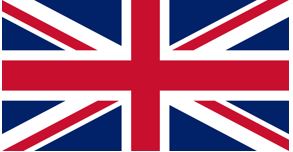
How do I get out of debt if I have no money?
You may not have the thousands of pounds you need to clear your debt straightaway, but there are several things you can do yourself to pay off your debt faster
Create a budget
A budget is a great way to control the cash leaking out of your account, and use it to pay off your debt faster. While most of us have a vague idea of what we earn and what our expenses are, we may be losing money on unnecessary expenses, and therefore staying in debt longer.
A great way to budget is the three accounts system. Developed by the charity Christians Against Poverty, it helps you separate your money into three accounts, and keep you from accidentally overspending. One account is for all your standing orders and direct debits, for example, your mortgage or rent, household bills and loan repayments, one is for your weekly spending and one is for saving.
Work out your exact income (that is, your monthly salary or government assistance payments), and how much your essential direct debits and standing orders amount to, and place those in the first account. Then, work out how much you need for essential spends such as your groceries, as well as a couple of treats, and place them in your second account. Whatever is left over you can save or put towards clearing your debt faster. This way, you won’t overspend unwittingly, because you have allocated the right amount of cash for each expense, and when it’s gone it’s gone (make sure your weekly spending account doesn’t have an overdraft, to avoid you getting into more debt).
If you feel safe doing so during the pandemic, you can take out your weekly spending money in cash and put it in different envelopes for different expenses (groceries, school shoes, weekly treat if you an afford it), so that you can physically see your cash going down.
Debt snowball method
Struggling with debt can be as much a psychological issue as a practical one. What you need to do is purposefully commit to getting debt free, and the debt snowball method is a great way to keep up your motivation for paying off debt.
You focus on paying off your smallest debt first, while making the minimum payments on all your other loans. This way you get the rush of paying off your debt faster, and once you’ve slashed the balances on your smallest debt, you move onto your next smallest, until finally, you’ve paid off all your loans. You can also consider the debt avalanche method, which is when you clear your debt with the highest interest the first, saving yourself money.
If you’re still unable to pay your debts
Obviously, there are some situations where debt is simply too much to control with simple lifestyle changes. Luckily, the UK has a number of solutions for dealing with insolvency (inability to pay debts). Let’s look at them now.
Individual Voluntary Arrangement
An Individual Voluntary Arrangement (IVA) is a government approved debt help scheme, which helps you if you’re struggling to repay your debts.
An IVA allows you to pay back a small percentage of your total debt, and get the rest of it written off. At the end of the IVA (which runs for 5-6 years), the rest of your debt gets cleared. You will make small, monthly payments towards your debt, based on what you can afford. Don’t worry. Your Insolvency Practitioner will look at your expenses and decide a reasonable amount for the monthly repayment, based on what you can afford. While an IVA does affect your credit score for the duration you have it, once your IVA is discharged (ended), your credit score will start to improve. IVA Advice offers free, qualified advice on getting an IVA.
Debt Relief Order (DRO)
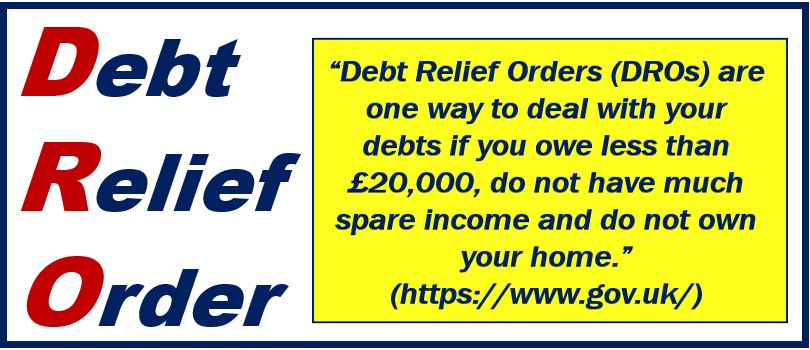
If you owe less than £20,000 in total and you have less than £50 disposable income, you could get a Debt Relief Order. This is a personal insolvency process which gives you legal protection from your creditors, and writes off your debt after one year. However, you have to own extremely little to qualify for a DRO, which means that very few people can get one. For example, you can’t get a DRO if you own your own home.
Now that we’ve gone through all the different solutions for dealing with debt worldwide, across India, the US and the UK, we hope you’ve found it a helpful and informative read. You can now decide which course of action is best for you, as you work out how to clear your debt, and look forward to a debt free life.
Interesting related article: “What is a Budget?“

